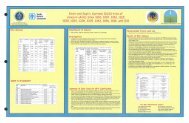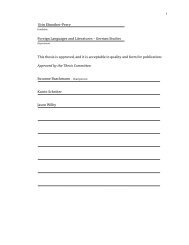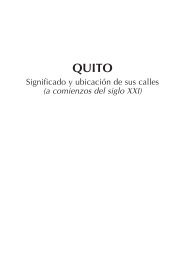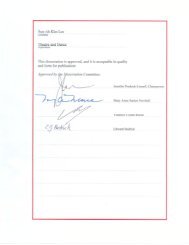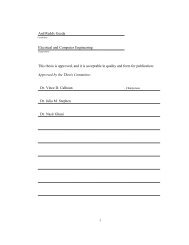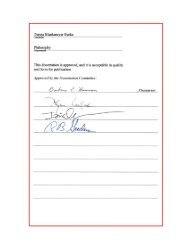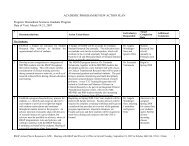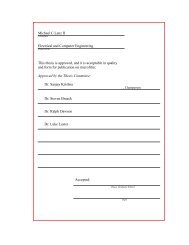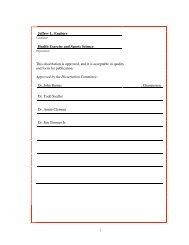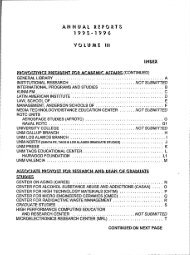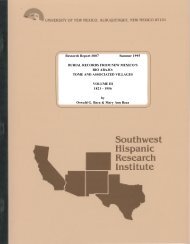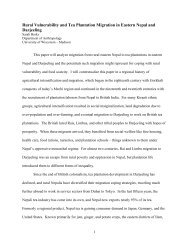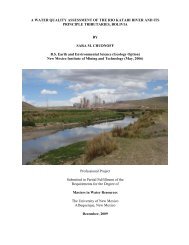- Page 1 and 2:
Patrick W. Staib Candidate Anthropo
- Page 3 and 4:
COFFEE AND THE COUNTRYSIDE: SMALL F
- Page 5 and 6: ACKNOWLEDGMENTS I heartily acknowle
- Page 7 and 8: Informal Economy in San Juan del R
- Page 9 and 10: Preface La sabiduria y la constante
- Page 11 and 12: aftershocks of a war in this commun
- Page 13 and 14: This chapter brings the reader into
- Page 15 and 16: Introduction: The Fieldwork I first
- Page 17 and 18: I had visited Matagalpa in 2000, wh
- Page 19 and 20: agricultural extension agents 3 in
- Page 21 and 22: Figure 1. Map of Nicaragua showing
- Page 23 and 24: Nevertheless, San Juan was the idea
- Page 25 and 26: Telpaneca today is a depressed muni
- Page 27 and 28: Figure 2. Electoral map of San Juan
- Page 29 and 30: espondents reported that at least o
- Page 31 and 32: In my experience assisting small-sc
- Page 33 and 34: fieldwork, including surveying, int
- Page 35 and 36: crop aggregation meeting simply bec
- Page 37 and 38: The following chapters are an overv
- Page 39 and 40: Don Amado raised his family of six
- Page 41 and 42: once-bustling colonial center of Nu
- Page 43 and 44: One afternoon, while sitting on his
- Page 45 and 46: Chapter 1 Regional Identity Formati
- Page 47 and 48: Vásquez’ records indicate that t
- Page 49 and 50: The native Segovians apparently coo
- Page 51 and 52: The role of native Segovians was ke
- Page 53 and 54: thousands 22 of passengers to Nicar
- Page 55: The Pueblos de Indios stood in the
- Page 59 and 60: The mid to late 1980s proved to be
- Page 61 and 62: The Indigenous Revolt of 1881 and I
- Page 63 and 64: These communities appear to have es
- Page 65 and 66: sectors of society forced rural com
- Page 67 and 68: Nationalist writers Gámez (1889),
- Page 69 and 70: San Juan farmers’ understandings
- Page 71 and 72: Sandinista Revolution made signific
- Page 73 and 74: Sandino’s Influential Rebellion A
- Page 75 and 76: Migrant workers in the Babilonia go
- Page 77 and 78: In an ironic turn of events, the Sa
- Page 79 and 80: Somoza regime and U.S. economic and
- Page 81 and 82: The high ideals of the Sandinista r
- Page 83 and 84: three special zones. Las Segovias,
- Page 85 and 86: economic activity for rural communi
- Page 87 and 88: Over time, some members wanted to g
- Page 89 and 90: Chapter 3 Personal Histories of Agr
- Page 91 and 92: to talk about the confiscation of S
- Page 93 and 94: mountains, El Malacate, El Majaste,
- Page 95 and 96: transport between Samarkanda and Sa
- Page 97 and 98: high-altitude farmland. Don Mundo,
- Page 99 and 100: areas. The Contras were former Guar
- Page 101 and 102: effort. As Don Ramón put it, “la
- Page 103 and 104: The project was called Huertos Fami
- Page 105 and 106: who is president of the Carlos Fons
- Page 107 and 108:
Part Two Development: International
- Page 109 and 110:
I consider how organic coffee fits
- Page 111 and 112:
Small-Scale Agrarian Communities, D
- Page 113 and 114:
Although the ideological justificat
- Page 115 and 116:
(Richards 1985; Dennis 1987). Latin
- Page 117 and 118:
dominated much of Third World expor
- Page 119 and 120:
depleting natural resources or degr
- Page 121 and 122:
communities experience tensions and
- Page 123 and 124:
I sat in and helped facilitate seve
- Page 125 and 126:
urning. When the wind was calm, our
- Page 127 and 128:
Marvin was involved with a rural en
- Page 129 and 130:
Hurricane Mitch and the Internation
- Page 131 and 132:
Conclusion Because the plant and th
- Page 133 and 134:
The Farmers of Las Grietas Upon mee
- Page 135 and 136:
stonemason and carpenter for local
- Page 137 and 138:
for work in the past five years? If
- Page 139 and 140:
for Danilo, but not as closely as w
- Page 141 and 142:
The lives of these three families h
- Page 143 and 144:
Adrian was able to invest in a bene
- Page 145 and 146:
employee dormitories. The large far
- Page 147 and 148:
Wiwilí. Danilo had to show proof o
- Page 149 and 150:
in Nicaragua, and I encountered it
- Page 151 and 152:
from the training in production tec
- Page 153 and 154:
farmers who receive pre-harvest fin
- Page 155 and 156:
award committee, in 2003 and 2004.
- Page 157 and 158:
time farm staff. Danilo, on the oth
- Page 159 and 160:
were able to accumulate large tract
- Page 161 and 162:
natural resources, to conserve, pro
- Page 163 and 164:
The growers share a collective resp
- Page 165 and 166:
Danilo, Maragojipe does not thrive
- Page 167 and 168:
In August and September, farmers fo
- Page 169 and 170:
gallon bucket of coffee cherries, a
- Page 171 and 172:
section with smaller Catuaí plants
- Page 173 and 174:
The beans turn from a pale green to
- Page 175 and 176:
Rainforest Alliance and the Audubon
- Page 177 and 178:
Figure 5. Depulping coffee with mot
- Page 179 and 180:
engañar facilmente (They [the brok
- Page 181 and 182:
farmers are not adept at these proc
- Page 183 and 184:
The International Cup of Excellence
- Page 185 and 186:
Organic Farming Responsibilities In
- Page 187 and 188:
The Nicaraguan Rural Development In
- Page 189 and 190:
unsuccessfully combated, can only b
- Page 191 and 192:
Organic Fertilizers Many coffee far
- Page 193 and 194:
community. This means, for example,
- Page 195 and 196:
application. Most farmers had not e
- Page 197 and 198:
They returned that evening empty-ha
- Page 199 and 200:
Danilo’s fields as we talked with
- Page 201 and 202:
converting to organic production. H
- Page 203 and 204:
in their cooperative and communitie
- Page 205 and 206:
organizational strategies present m
- Page 207 and 208:
Part Three Outcomes: Cooperative Or
- Page 209 and 210:
organizational models that have bee
- Page 211 and 212:
coffee farmer, and José Manuel Mor
- Page 213 and 214:
El estado cuenta con nosotros porqu
- Page 215 and 216:
company” (la empresa) when talkin
- Page 217 and 218:
their estimated yield should cover
- Page 219 and 220:
firm, CISA/AGRO. Corcasan has its o
- Page 221 and 222:
earning higher prices for their far
- Page 223 and 224:
funding package. Corcasan brought i
- Page 225 and 226:
The credit model from banks and mic
- Page 227 and 228:
green coffee that weighed 412 quint
- Page 229 and 230:
This is not an exact measurement, b
- Page 231 and 232:
only for a few select farmers. That
- Page 233 and 234:
Tito is Heberto’s oldest son. He
- Page 235 and 236:
Towards the end of my fieldwork the
- Page 237 and 238:
Danilo received several of the bene
- Page 239 and 240:
prohibited on this farm).” Some f
- Page 241 and 242:
One afternoon in August 2006, near
- Page 243 and 244:
single gas station in San Juan. Bro
- Page 245 and 246:
camp, was only 30 kilometers away.
- Page 247 and 248:
emote parts of the community to fin
- Page 249 and 250:
apparently the more diligent farmer
- Page 251 and 252:
Chapter 8 Community-Based Campesino
- Page 253 and 254:
campesinos y del ecosistema. No hay
- Page 255 and 256:
Nosotros en la Procaoc vendemos apa
- Page 257 and 258:
have the capacity to supply the dem
- Page 259 and 260:
instructor, actually instructs farm
- Page 261 and 262:
transparencia (There’s problems w
- Page 263 and 264:
waste my time with the smaller farm
- Page 265 and 266:
Javier Vanegas, accountant for the
- Page 267 and 268:
conversation provided a foundation
- Page 269 and 270:
carpenter; and Jorge, the assistant
- Page 271 and 272:
“Nosotros [Guillermo Hernández]
- Page 273 and 274:
en el servicio. (They gave it to me
- Page 275 and 276:
The cooperative model for export ag
- Page 277 and 278:
day went on. The music changed to l
- Page 279 and 280:
would ask me about my research and
- Page 281 and 282:
familiar with the community of Guan
- Page 283 and 284:
houses and additional farmland, but
- Page 285 and 286:
statement was in reference to Corca
- Page 287 and 288:
colonial history in Chapter 1), the
- Page 289 and 290:
Conclusion Regional Segovian identi
- Page 291 and 292:
production and marketing of organic
- Page 293 and 294:
economic development programs. In t
- Page 295 and 296:
capacity of their fellow farmers. T
- Page 297 and 298:
encountered in trying to conserve r
- Page 299 and 300:
Benjamin, Medea 1987 Don’t Be Afr
- Page 301 and 302:
Enríquez, Laura J. 1991 Harvesting
- Page 303 and 304:
Guido, Clemente 1989 Los Conservado
- Page 305 and 306:
MAGFOR 2004 Estrategia para la reco
- Page 307 and 308:
Redford, Kent H. and Allyn. M. Stea
- Page 309 and 310:
Turner, Terence 1991 Representing,
- Page 311 and 312:
Appendix EL SIGÜIENTE COMUNICADO R




